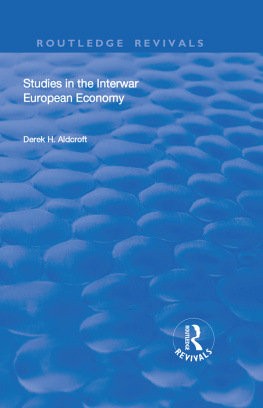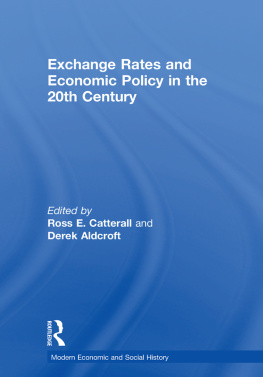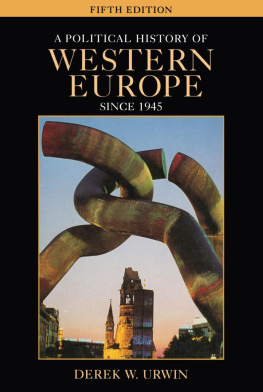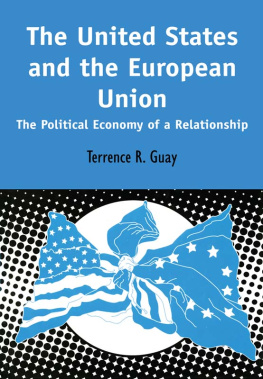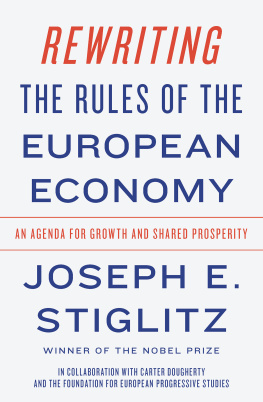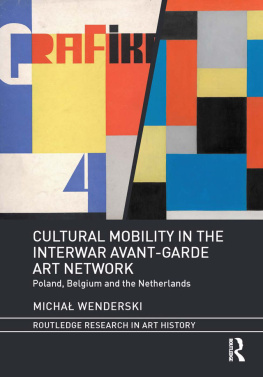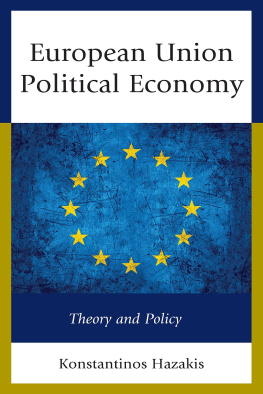Studies in the Interwar European Economy
Modern Economic and Social History Series
General Editor: Derek H. Aldcroft
Titles in this series include:
Studies in the Interwar European Economy
Derek H. Aldcroft
Whatever Happened to Monetarism? Economic Policy-Making and Social Learning in the United Kingdom since 1979
Michael J. Oliver
Battles for the Standard: Bimetallism and the Spread of the Gold Standard, 1870-1914
Edward R. Wilson
The British Footwear Industry
Peter R. Mounfield
Trade Unions and the Economy
Derek H. Aldcroft and Michael J. Oliver
Raleigh and the British Bicycle Industry: An Economic and Business History since the 1880s
Roger Lloyd-Jones, M. J. Lewis and M. Eason
The British Electronics Industry: Innovation, Markets and Performance, 1930-97
John F. Wilson
The Seaside, Health and the Environment since 1850
John Hassan
First published 1997 by Ashgate Publishing
Reissued 2018 by Routledge
2 Park Square, Milton Park, Abingdon, Oxon, 0X14 4RN
711 Third Avenue, New York, NY 10017, USA
Routledge is an imprint of the Taylor & Francis Group, an informa business
Copyright Derek H. Aldcroft, 1997
All rights reserved. No part of this book may be reprinted or reproduced or utilised in any form or by any electronic, mechanical, or other means, now known or hereafter invented, including photocopying and recording, or in any information storage or retrieval system, without permission in writing from the publishers.
Notice:
Product or corporate names may be trademarks or registered trademarks, and are used only for identification and explanation without intent to infringe.
Publishers Note
The publisher has gone to great lengths to ensure the quality of this reprint but points out that some imperfections in the original copies may be apparent.
Disclaimer
The publisher has made every effort to trace copyright holders and welcomes correspondence from those they have been unable to contact.
A Library of Congress record exists under LC control number: 96040442
Typeset in Sabon by Manton Typesetters, 5-7 Eastfield Road, Louth, Lincolnshire, LN 11 7AJ
ISBN 13: 978-1-138-35966-6 (hbk)
ISBN 13: 978-0-429-43355-9 (ebk)
For Andrea and Louise
Modern Economic and Social History Series General Editors Preface
Economic and social history has been a flourishing subject of scholarly study during recent decades. Not only has the volume of literature increased enormously but the range of interest in time, space and subject matter has broadened considerably so that today there are many sub-branches of the subject which have developed considerable status in their own right.
One of the aims of this new series is to encourage the publication of scholarly monographs on any aspect of modern economic and social history. The geographical coverage is world-wide and contributions on non-British themes will be especially welcome. While emphasis will be placed on works embodying original research, it is also intended that the series should provide the opportunity to publish studies of a more general and thematic nature which offer a reappraisal or critical analysis of major issues of debate.
Derek H. Aldcroft
Manchester Metropolitan University
Most of the chapters in this volume have their origin in papers or lectures presented at various centres of learning in Brussels, Brisbane, Barcelona, Madrid, Milan, Lausanne, Paris, Tenerife and Vienna in recent years. is a revised version of Depression and recovery: the Eastern European experience, which appeared in Capitalism in Crisis: International Responses to the Great Depression, edited by W. R. Garside (1993) and published by Pinter of London.
I should like to thank Dr John Hassan and Dr Steven Morewood for reading various chapters and for their helpful comments. Thanks are also due to Alec McAulay for his patience and enthusiasm with a demanding author.
Derek H. Aldcroft
Manchester Metropolitan University
Though the First World War caused much loss of life, destruction and devastation which rendered Europe virtually destitute by the latter half of 1918, it can nevertheless be argued that the immediate consequences of more than four years of hostilities were less important than the postwar settlement in determining the longer-term future of Europe. Keynes, in his vitriolic denunciation of the peace treaty with Germany, recognised its defects in regard to the future of Europe (Keynes, 1920, p. 211), but the postwar settlement had far wider connotations than he envisaged at the time of writing. The term Versailles settlement used here therefore embraces not only the formal peace treaties with the enemy powers, but also the varied clearing-up operations which arose such as the question of reparations and war debts, the arrangements for relief and reconstruction, the establishment of the League of Nations, together with the role of the United States in postwar Europe. The position of the United States assumes significance because it emerged from the war as the most powerful nation in the world. While it replaced Europe as the potential leader in world affairs, in practice the United States exercised this role reluctantly, quickly making a political and military retreat from European affairs as isolation took hold, though maintaining an arms-length economic interest until the great depression. Europe, on the other hand, failed to recapture its former preeminence partly because the postwar settlement precluded that possibility, even though European leaders played a major role in designing that settlement, and partly because American policy indirectly worked against Europes revival.
This chapter concentrates on some of the features of the settlement deemed especially relevant in the context of Europes future: the redrawing of the map of Europe; the treatment of Germany; the machinery for reconstruction; and the equivocal attitude of the United States towards the problems of Europe. The following chapter takes up some additional themes and provides an overall conclusion.
The new Europe
The new postwar boundary arrangements constituted the biggest exercise in the reshaping of the political geography of Europe ever undertaken (Thompson, 1966, p. 626) and, according to some writers, possibly one of the most disastrous (Hobsbawm, 1994, p. 31). The process involved the greater part of the Continent and the only countries not affected were Holland, Spain, Luxembourg, Switzerland and Portugal. Large tracts of land and their populations and resources were reallocated, about a dozen new or reconstituted states were brought into being, while political frontiers were lengthened by some 12 500 miles (Gordon, 1941, p. 19).
The mundane details of the new geographical configuration need not detain us here. What is important is to assess the implications for the future stability of Europe. Possibly the most important factor was the power vacuum which arose in East-Central Europe. It was in this region that most of the new or reconstituted states emerged (Austria, Hungary, Czechoslovakia, Yugoslavia and Poland, for example) in place of the former Austro-Hungarian Empire. The latter was certainly a troublesome empire to administer and towards the end of the war it was in an advanced state of terminal decay. But for all its faults it did have a certain degree of economic coherence and during the nineteenth century it had acted as an important stabiliser in the European balance of power, one reason, no doubt, why the Allied powers were reluctant to witness its disintegration. Unfortunately they had very little choice in the matter since even before the end of hostilities nationalist groups were laying claim to territories, many of which were later confirmed by the Allied statesmen.

